“New faces: Charlotte’s Growing Interfaith Community” sponsored by Mecklenburg Ministries, Programa Esperanza, Community Relations Committee and International Ministries
Tuesday, 13 November 2001, First United Methodist Church, Charlotte, NC
by Ken Sehested
In the 19th chapter of the gospel of Luke, in the Christian Newer Testament, is this brief transition narrative as Jesus approaches Jerusalem. He’s near the end of his career and is prepared for a showdown with the ruling elites of the age. And you should know that Luke purposefully arranges this episode immediately before the story of Jesus’ outburst in the Temple, where he turns over the money-changers’ tables, a notorious racket whereby corrupt religious authorities colluded with unscrupulous entrepreneurs to exploit poor and working-class people during their expression of religious fidelity and devotion.
The text to which I want to call your attention reads: “As he came near and saw [Jerusalem], he wept over it, saying, ‘If you, even you, had only recognized on this day the things that make for peace! But now they are hidden from your eyes.’”
I visited “Ground Zero” in New York City a week ago. I was there for a speaking assignment, but also included a visit with my first-born child who lives some 18 blocks from the devastation of what used to be the World Trade Center twin towers. You still can’t get very close, of course—maybe two or three blocks away—and it’s hard to see much from street level. But the smell in the air, something like that of burning plastic, was sufficient testimony to what lay behind the temporary barriers. For anyone familiar with the neighborhood, what is not seen is actually more disconcerting that what is seen.
My flight into the area was to Newark Airport just across the bay from New York City. As it happened, the plane landed from the north, and since I was sitting on the left side of the plane I got an excellent view of the Manhattan skyline. It’s a very familiar sight, since I lived there for seven years, and I could name a number of the buildings. But then there’s this big vacant air space at the southern tip of the island. It was almost more than I could bear. I could feel the accumulation of moisture around my eyes as a deep sadness swept over me yet again.
No doubt you, too, are personally acquainted with this kind of grief. We are not yet done crying.
The twentieth century was begun amid exaggerated hopes of human achievement. Some of you may know the magazine titled “The Christian Century,” which was begun in the late 1800s on the cusp of what was then the approaching new century. It’s very name is testimony to the optimism which pervaded our culture, reflecting the scientific and industrial progress of the era and the supposed religious enlightenment which the faith would bring to the whole world—in coordination with American economic and military power, of course.
At the far end of that hopeful projection, we know differently. The twentieth century may well be termed by future historians as the “American century” but I hope to God the notion of it being a “Christian century” will be forgotten. In the last 100 years war alone caused an estimated 110 million deaths, more than one million per year on average. Structural violence in various forms—hunger and poverty, racism, easily preventable disease, along with innumerable forms of human rights violations based on gender, political conviction, sexual orientation, religious affiliation, among others—has caused another 19 million deaths per year.
Using conservative estimates, well over one billion deaths occurred in this bloodiest of centuries in recorded history. Based on the horrific events we now refer to in shorthand as “911,” our new century has at least the emotional impact of apocalypse. The smell of burning plastic. Holes in our urban landscape. The complete and literal incineration of thousands of people within a single city block.
And now the retaliation is well underway. The artist Käthe Kollwitz, who has documented the suffering of war so vividly with her charcoal and canvas portraits, wrote: “Every war already carries within it the war which will answer it. Every war is answered by a new war, until everything, everything is smashed.”
On most days, these thoughts more than I can take in at once.
My purpose this evening is not to preview my own political analysis of our present crisis. Such analysis has to be done, if we are to understand what got us to this place and how we might move from this bloody juncture to a new and more humane future. But I simply must draw your attention to that future being dreamed by some—a kind of fatal attraction to vengeance—and urge you to imagine alternatives. The evidence for this bloodthirsty urge comes from but two of many sources to which I could point. The first is from Lance Morrow, the esteemed essayist for Time magazine, who wrote a blistering column in the special Sept. 11 issue of the journal. And I quote:
“For once, let’s have no fatuous rhetoric about ‘healing’. . . . Let’s have rage. . . a policy of focused brutality . . . and relearn why human nature has equipped us all with a weapon called hatred.”
The second bit of evidence is from a bumper sticker sold at our local military surplus store. It reads, very succinctly: “Nuke their ass and steal their gas.”
And Jesus wept over the city, crying “would that you knew the things that make for peace.”
Instead of an analysis, I want to tell you a story. And then conclude with some specific suggestions, which might be relevant to an interfaith agenda for building a culture of peace.
Long ago, in a perilous time of great change, in an Italian forest outside a village called Gubbio, lived a fierce and terrible wolf. This wolf terrorized the citizens of the village; he ate their chickens, consumed their sheep, and chased their children. Sometimes the wolf even ate a child. The people of Gubbio lived in fear, never went anywhere alone, and always carried weapons to protect themselves when they left the village. They tried everything to get the wolf to stop: they caged the chickens, penned the sheep, and locked their children in their homes. Still, the wolf struck. Eventually, they became so fearful, no one ever left the village. The people heard that in a neighboring town of Assisi lived a man who could speak, and better still, understand, the language of animals. In desperation, they sent for him, and begged him to come to their village and talk to the wolf. When Saint Francis heard their story, he had great compassion for the people, and agreed to come to Gubbio.
When he arrived at the village gates, the whole town came to meet him. He turned to go into the forest, and all the people stayed inside the gates and watched him go. When the wolf saw him coming, he rushed forward to devour him. But Saint Francis raised his hand and spoke to him, calling him "Brother Wolf." The wolf was so surprised to hear a man speak to him in language he could understand that he shrank back to listen.
According to tradition, Saint Francis then said to him: "Brother Wolf, you have done great harm in these parts, and committed great crimes, ravaging and slaying God's creatures without His leave. Not only have you killed and eaten beasts but have dared to kill and devour human beings. For these things you deserve to hang as a robber and vile murderer: all the people cry out in complaint against you, and the whole district hates you. I have only one thing to ask you, Brother Wolf. Why have you committed these terrible crimes?"
The wolf looked up at Saint Francis and simply said, "I was hungry."
Then Saint Francis said, "Brother Wolf, I wish to make peace between you and the townsfolk. If you agree not to eat their chickens, or their sheep, or their children anymore, they will forgive you, and not hunt you anymore. Do you agree?"
At these words, "by the movement of his body, tail and eyes, and by bowing his head," the wolf showed that he accepted Saint Francis' proposal, and was willing to observe it. Then, the wolf asked, "But what will I eat?" Then Saint Francis said: "Brother Wolf, since you are ready to make this peace and keep it, the people of Gubbio will feed you for as long as you live, and you will not go hungry any more. Do you promise not to hurt human or beast ever again?" Saint Francis held out his hand to receive the wolf's promise, and the wolf raised his paw and placed it gently in Saint Francis' hand, giving proof of his good faith.
Together, the wolf and Saint Francis walked back into the village. The people were amazed and stood back to let them pass. "Listen, my friends," said Saint Francis, "Brother Wolf, who stands here before you, has promised to make peace with you, and never to hurt you if you promise to feed him every day. Will you promise?" And the villagers agreed. From that day, the wolf and the people lived happily together in Gubbio. The people fed the wolf, and the wolf never harmed anyone. The children could play again and everyone slept peacefully at night. [Taken from the internet with this credit: adapted from The little Flower of St. Francis, trans. By L. Sherley-Price, Penguin Books, London, 1959]
Paul Ricouer has written that if we are to change people’s loyalties, we must change their imagination. I dare say that all our religious traditions have such stories. It’s time we get them out, dust off the cobwebs of neglect, and feature them with urgent intent in our homes and sanctuaries.
The line I often repeat these days within my own confessional tradition is this: The failure to love enemies is to hedge on Jesus. But how are we to love enemies? How are we to move beyond sentimental and pious rhetoric to concrete action? How is it possible to build a culture of peace? Criminal acts, whether within the family of nations or in our own neighborhoods, must be resisted and those responsible brought to justice. The commonweal must be restored. But justice is different than vengeance, and restoring justice is different from retaliation.
We at the Baptist Peace fellowship have adapted the language of “building a culture of peace” for our own purposes. It was first suggested by a document signed three years ago by all the living Nobel Peace prize recipients, calling for a decade for overcoming violence; it was later approved by action of the united Nations general Assembly and then appropriated by the World Council of Churches as a theme and program priority for this decade.
We like the phrase “building a culture of peace’ because it is very proactive—peace doesn’t just fall from the sky; it must be built. We like the phrase because it emphasizes the nongovernmental components of peacemaking—the tasks that must be accomplished and neighborly covenants that must be upheld in our own communities and neighborhoods, in our schools and civic groups and communities of faith. Peacemaking is more than the role of politicians and trained negotiators. Like building a Habitat for Humanity house, everybody can play a part—you don’t have to be a specialist or a professional. And like building any structure, it happens one step at a time. It begins by raising children in ways that teach them how to respond to conflict without picking up a stick. As the Hebrew prophets repeatedly insist, any harvest of peace begins with sowing justice.
So how can we build a culture of peace? How can we move toward what Dr. Martin Luther King Jr. called “the beloved community”?
Let me name some very practical suggestions, which we can do together as an interfaith community of concern.
Let me begin with two very specific requests: First, let me encourage every one of you to write to President Bush to urge a halt in the bombing of Afghanistan at least during the Muslim holy season of Ramadan, which begins later this week. If for no other reason, the motivation has to do with the dire humanitarian emergency present in that ravaged country. Numerous international aid agencies agree that, after more than two decades of war, and three years of serious drought—compounded by the onset of severe winter snow storms which disrupt transportation—some seven million people are at risk of starvation—as much as one-third of the country. Even a month-long cessation of the bombing would allow humanitarian aid to reach those most effected.
Second—especially if you want to fly a flag—let me urge you to fly the flag of the United Nations as a counter-statement to the outbreak of militant patriotism now sweeping our land. [show flag]
My third suggestion is actually a bundle of ideas which I’m grouping together under the heading of “crossing boundaries.” Boundaries, borders, lines of demarcation are things we commonly establish in the course of our daily lives, and they can be useful in helping us live humanely with each other. But boundaries have a decided tendency to become barriers to human community. They have a tendency to become destructive to our relationships. They often cut us off from “the other,” and over time become impediments to our common pursuit of justice and fairness. They wall in our sense of compassion, of our solidarity with human suffering, so that our otherwise compassionate vision becomes stunted, near-sighted, unable to see over the borders, unable to look beyond the boundaries.
These boundaries take many different forms over time, and you are well aware of some of their manifestations. The issue of race continues to be a major source hostility in this country and in this community. Social class and educational background are boundaries that bind us to parochial visions and self-centered behavior. Religious affiliation obviously plays a role in shaping destructive boundaries. There’s an awful lot of “my God can whip your God” sentiments in the air these days.
There are many forms of these boundaries. The point is, we urgently need to find a way to mount a nonviolent assault on these harmful boundaries; we need to discover the spiritual resources which address our fears of ‘the other” in such a way that empowers our communities—not to necessarily destroy the boundaries—I’m not suggesting we homogenize our cultures and racial/ethnic groups and religious confessions—but to make them porous, to establish bridges across them to encourage interaction and mutual understanding and respect.
One very specific recommendation: if you faith community is not familiar with the communities of Muslim and/or Arab communities here in Charlotte, take the initiative to cross that boundary. Find out who’s here, what their life is like, what they feel about the current crisis here in our country and the war in Afghanistan.
As a concrete act of solidarity, consider joining our Muslim neighbors in their observance of Ramadan, specifically in the spiritual discipline of fasting. Find out why and how Muslims fast during Ramadan, and join them—whether for a short time or for the entire month. The emphases of Ramadan—prayer, fasting, intentional reflection—are themes common to all our religious traditions.
One of the people I was with in a retreat last week helping start a new faith-based initiative in the city of Philadelphia where he lives. It happened when he and others learned that Muslim women, because of their traditional dress, were being harassed when they left their homes to go shopping or to attend meetings. So a group formed to provide escort services for these women to help ensure their safety, and also to act as volunteer guards at mosques during traditional Friday prayer services, as a way to discourage acts of vandalism.
This is the kind of creativity and imagination which we as people of faith need to foster in our communities. Indeed, another common theme in all our religious traditions is that our work as advocates for the marginalized, our active intercession—in word and in deed—for any who are abused, who are provided no space at our common table, who are given no voice in deciding our common good—these are in fact the highest forms of piety, of devotion, of demonstration that the love of God does indeed dwell in our hearts and not just on our lips.
Let me close with my favorite prose poem, lyrics, which have become something of the unofficial anthem of my organization. They come from the writings of walker knight, a retired Baptist editor and close friend.
Peace plans its strategy and encircles the enemy.
Peace marshals its forces and storms the gates.
Peace gathers its weapons and pierces the defense.
Peace, like war, is waged.
But Christ has turned it all around:
the weapons of peace are love, joy, goodness, longsuffering;
the arms of peace are justice, truth, patience, prayer;
the strategy of peace brings safety, welfare, happiness;
the forces of peace are the sons and daughters of God.
[Walker Knight, excerpted from a larger prose poem entitled "The Peacemaker" in Home Missions Magazine, December 1972]
# # #


 ¶ Invocation. “With good pleasure, in the beginning, the Beloved aspired all that now breathes. Then again, in the Lovely One, even Christ Jesus, the Wind of Heaven confounds the wail of rancor. Come, heaven! Come, earth! With mercy so tender, adopted in splendor, all bloodletting malice shall melt into praise.” (Continue reading “
¶ Invocation. “With good pleasure, in the beginning, the Beloved aspired all that now breathes. Then again, in the Lovely One, even Christ Jesus, the Wind of Heaven confounds the wail of rancor. Come, heaven! Come, earth! With mercy so tender, adopted in splendor, all bloodletting malice shall melt into praise.” (Continue reading “ ¶ Just amazing. Vivian Boyack, age 91 (at left in the photo), and Alice “Nonie” Dubes, age 90, have been together for 72 years, and this past weekend they tied the knot in Davenport, Iowa. “This is a celebration of something that should have happened a very long time ago,” said Rev. Linda Hunsaker who performed their wedding. (Photo by Thomas Geyer)
¶ Just amazing. Vivian Boyack, age 91 (at left in the photo), and Alice “Nonie” Dubes, age 90, have been together for 72 years, and this past weekend they tied the knot in Davenport, Iowa. “This is a celebration of something that should have happened a very long time ago,” said Rev. Linda Hunsaker who performed their wedding. (Photo by Thomas Geyer) ¶ It is a myth that “founding father” Benjamin Franklin recommended that a turkey replace the bald eagle on the first Great Seal of the US, created by the Second Continental Congress, though he did have disparaging words about the eagle. Some might say Franklin’s estimate of the eagle’s character flaws was inadvertently prophetic.
¶ It is a myth that “founding father” Benjamin Franklin recommended that a turkey replace the bald eagle on the first Great Seal of the US, created by the Second Continental Congress, though he did have disparaging words about the eagle. Some might say Franklin’s estimate of the eagle’s character flaws was inadvertently prophetic. ¶ The American way. “Oh, justice will be served and the battle will rage: / This big dog will fight when you rattle his cage. / An' you'll be sorry that you messed with the U.S. of A. / 'Cause we'll put a boot in your ass, it's the American way." —Toby Keith, “Courtesy of the Red, White, and Blue” (aka “The Angry American”)
¶ The American way. “Oh, justice will be served and the battle will rage: / This big dog will fight when you rattle his cage. / An' you'll be sorry that you messed with the U.S. of A. / 'Cause we'll put a boot in your ass, it's the American way." —Toby Keith, “Courtesy of the Red, White, and Blue” (aka “The Angry American”)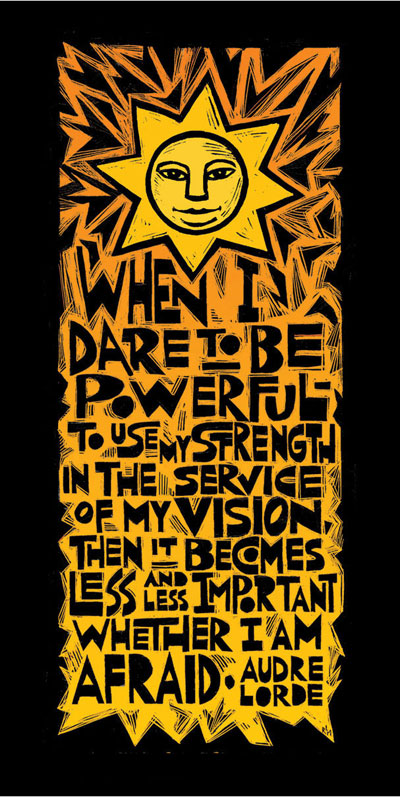 ¶ Words of assurance. Among the memory prods in Charleston’s aftermath is the reminder about the Spirit’s lurking—about whose presence we must foster, which whereabouts we must find, if we are to hear with clarity the proffered promise:
¶ Words of assurance. Among the memory prods in Charleston’s aftermath is the reminder about the Spirit’s lurking—about whose presence we must foster, which whereabouts we must find, if we are to hear with clarity the proffered promise: ¶ The coincidence of the massacre in Charleston on 17 June and the release on 18 June of Pope Francis’ encyclical on the environment (“Laudato Si,” Latin for “Praised Be to You,” which appears in “Canticle of the Sun” by St. Francis, the Pope’s namesake) resulted in the latter being squeezed from the news. Following are a few significant quotes.
¶ The coincidence of the massacre in Charleston on 17 June and the release on 18 June of Pope Francis’ encyclical on the environment (“Laudato Si,” Latin for “Praised Be to You,” which appears in “Canticle of the Sun” by St. Francis, the Pope’s namesake) resulted in the latter being squeezed from the news. Following are a few significant quotes.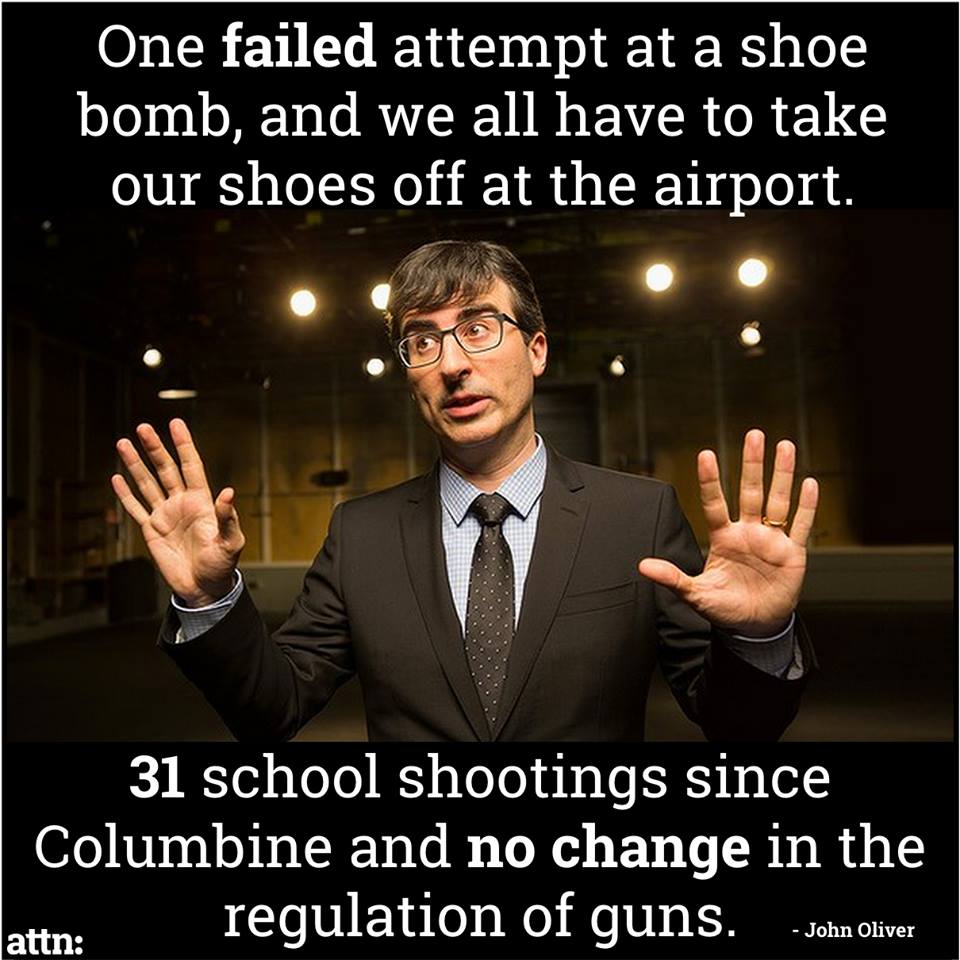 ¶ If your primary source for public information on “terrorism” is mainstream headlines, you’d think jihadists are public enemy number one. But the 2014 Police Executive Research Forum says otherwise. “An officer from a large metropolitan area said that ‘militias, neo-Nazis and sovereign citizens’ are the biggest threat we face in regard to extremism.'
¶ If your primary source for public information on “terrorism” is mainstream headlines, you’d think jihadists are public enemy number one. But the 2014 Police Executive Research Forum says otherwise. “An officer from a large metropolitan area said that ‘militias, neo-Nazis and sovereign citizens’ are the biggest threat we face in regard to extremism.' past 13.5 years. In contrast, right-wing extremists averaged 337 attacks per year in the decade after 9/11, causing a total of 254 fatalities.” —Charles Kurzman and David Schanzer, The Other Terror Threat,” New York Times
past 13.5 years. In contrast, right-wing extremists averaged 337 attacks per year in the decade after 9/11, causing a total of 254 fatalities.” —Charles Kurzman and David Schanzer, The Other Terror Threat,” New York Times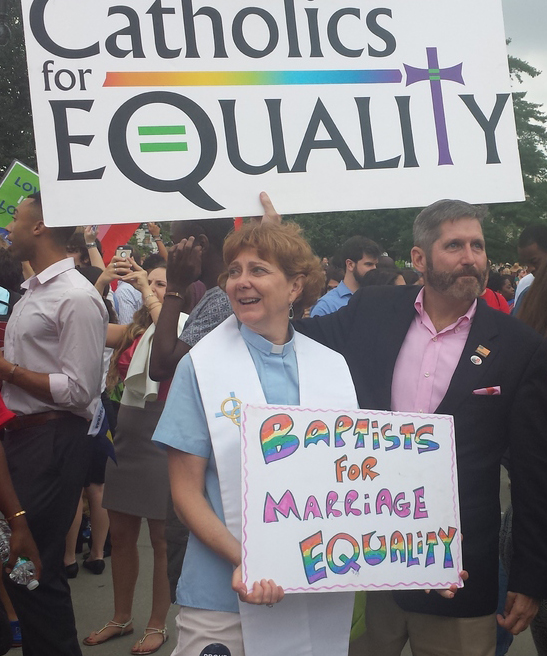 ¶ Invocation. A different “Glory, Glory, Hallelujah” (
¶ Invocation. A different “Glory, Glory, Hallelujah” ( ¶ “Columbia University on Monday announced that it would divest from the private prison industry and ban reinvestment in companies that operate prisons, making it the first college “ to divest. “The announcement follows 16 months of campaigning by the prison abolitionist group Students Against Mass Incarceration, which launched after a number of students discovered in 2013 that the school had invested roughly $10 million of its endowment in the Corrections Corporation of America (CCA) and G4S, two for-profit companies that operate private detention centers and prisons around the world.” —Nadia Prupis, “Following Student-Led Campaign, Columbia to Divest from Prisons”
¶ “Columbia University on Monday announced that it would divest from the private prison industry and ban reinvestment in companies that operate prisons, making it the first college “ to divest. “The announcement follows 16 months of campaigning by the prison abolitionist group Students Against Mass Incarceration, which launched after a number of students discovered in 2013 that the school had invested roughly $10 million of its endowment in the Corrections Corporation of America (CCA) and G4S, two for-profit companies that operate private detention centers and prisons around the world.” —Nadia Prupis, “Following Student-Led Campaign, Columbia to Divest from Prisons” Your Land” as a rejoinder. The song has occasionally been played at professional sporting events as a substitute for “The Star Spangled Banner,” and numerous Major League Baseball teams play it during the seventh-inning stretch.
Your Land” as a rejoinder. The song has occasionally been played at professional sporting events as a substitute for “The Star Spangled Banner,” and numerous Major League Baseball teams play it during the seventh-inning stretch.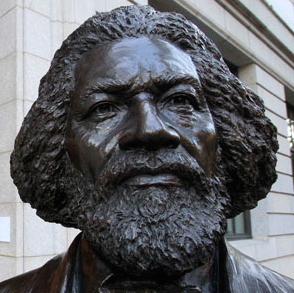 ¶ “‘
¶ “‘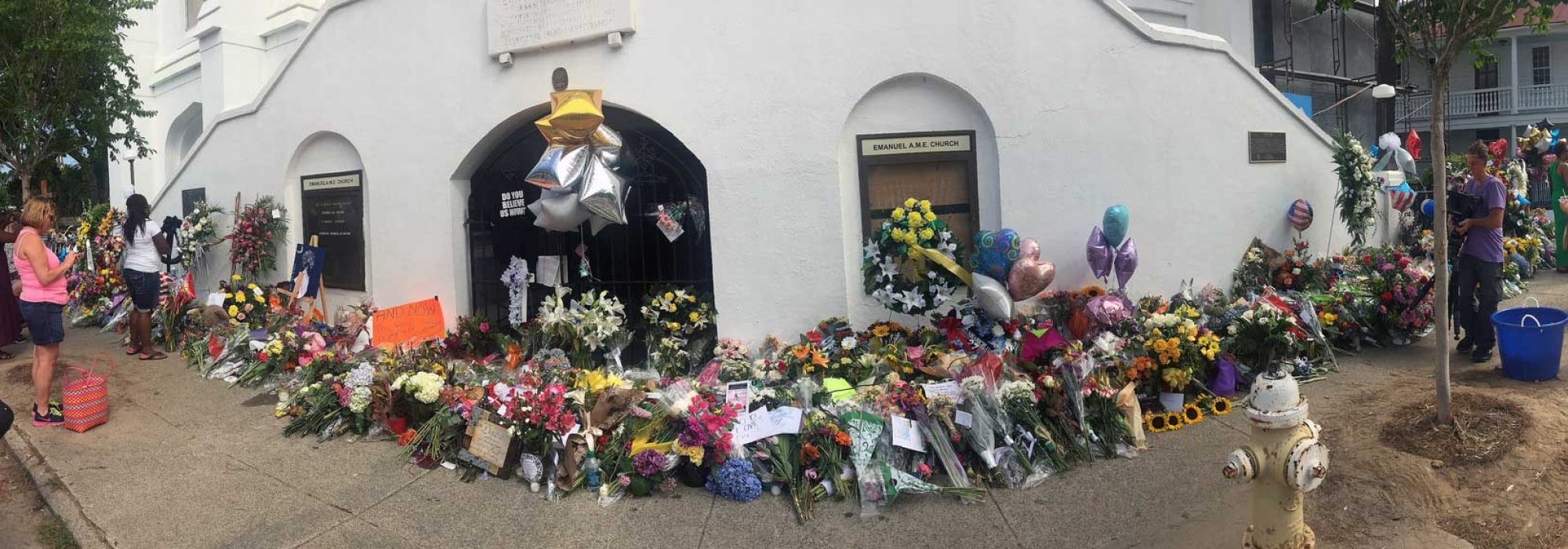 ¶ “The doors are open at Emanuel this Sunday, sending a message to every demon in Hell and on Earth that no weapon, no weapon, shall prosper!” —Rev. Norvel Goff, named interim pastor at Emanuel AME Church following the 17 shooting, referencing Isaiah 54:17: “No weapon that is fashioned against you shall prosper, and you shall confute every tongue that rises against you in judgment. This is the heritage of the servants of the Lord and their vindication from me, says the Lord.”
¶ “The doors are open at Emanuel this Sunday, sending a message to every demon in Hell and on Earth that no weapon, no weapon, shall prosper!” —Rev. Norvel Goff, named interim pastor at Emanuel AME Church following the 17 shooting, referencing Isaiah 54:17: “No weapon that is fashioned against you shall prosper, and you shall confute every tongue that rises against you in judgment. This is the heritage of the servants of the Lord and their vindication from me, says the Lord.”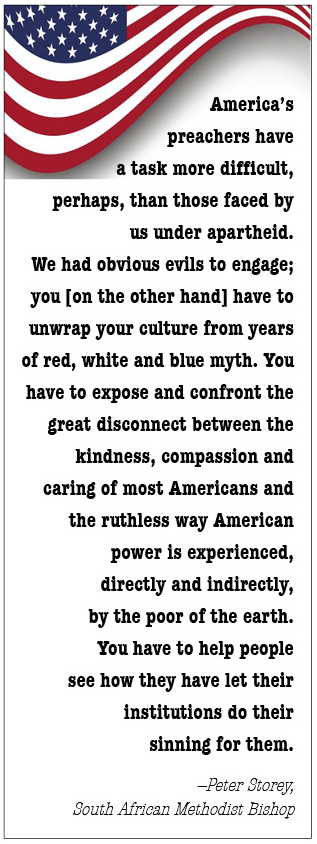 ¶ This
¶ This 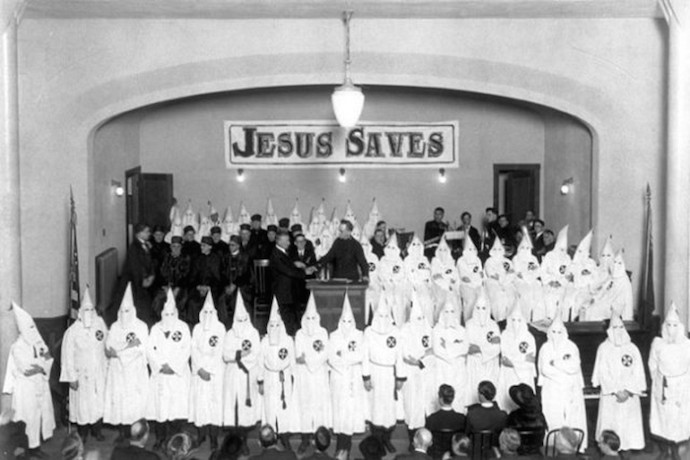 ¶ This photo (right) is from the early 1920s, probably in Portland, Oregon, in which robed and hooded Ku Klux Klan members share a stage with members of the Royal Riders of the Red Robe, a Klan auxiliary for foreign-born white Protestants. A large banner reading “Jesus Saves” occupies a prominent position on the wall at the rear of the stage and testifies to the strong role that Protestantism played in the KKK philosophy of “100 percent Americanism.”
¶ This photo (right) is from the early 1920s, probably in Portland, Oregon, in which robed and hooded Ku Klux Klan members share a stage with members of the Royal Riders of the Red Robe, a Klan auxiliary for foreign-born white Protestants. A large banner reading “Jesus Saves” occupies a prominent position on the wall at the rear of the stage and testifies to the strong role that Protestantism played in the KKK philosophy of “100 percent Americanism.” • Retailers Walmart, Amazon, Sears, Ebay and Etsy announced bans on the sale of Confederate flag merchandise.
• Retailers Walmart, Amazon, Sears, Ebay and Etsy announced bans on the sale of Confederate flag merchandise. ¶ Call to the table. “Forgiveness is the only way to reverse the irreversible flow of history.” —Hannah Arendt
¶ Call to the table. “Forgiveness is the only way to reverse the irreversible flow of history.” —Hannah Arendt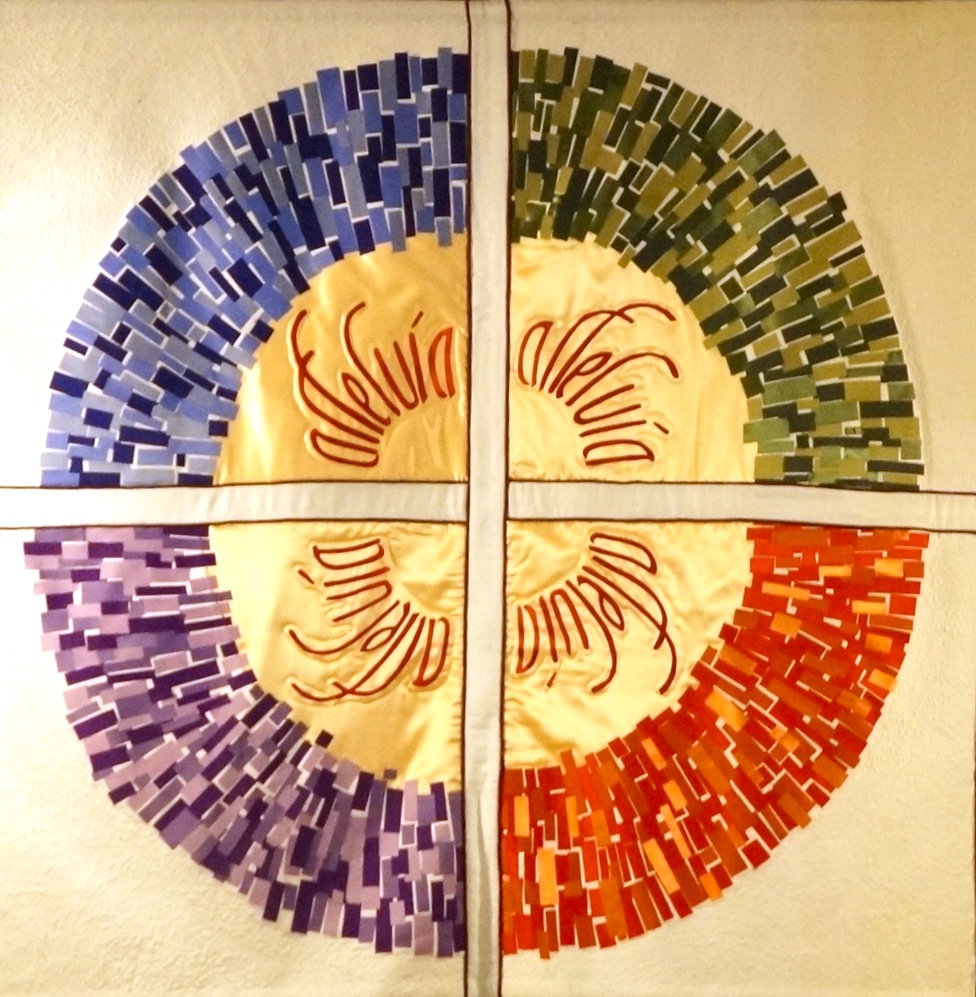 ¶ Invocation. “The Lord’s my shepherd, I’ll not want / Green pastures rise and from the font / Flow waters, ever gentle, to surround me / My soul restored, my heart aflame / My feet will walk and for that Name / My lungs will lift to sing, Hallelujah. —Ken Sehested, first verse of new lyrics (adapted from from Psalm 23) to Leonard Cohen’s song, “
¶ Invocation. “The Lord’s my shepherd, I’ll not want / Green pastures rise and from the font / Flow waters, ever gentle, to surround me / My soul restored, my heart aflame / My feet will walk and for that Name / My lungs will lift to sing, Hallelujah. —Ken Sehested, first verse of new lyrics (adapted from from Psalm 23) to Leonard Cohen’s song, “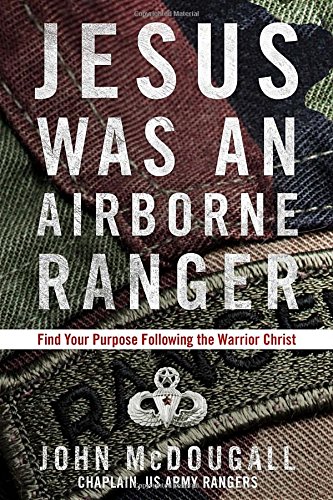 ¶ “An active-duty Army chaplain with the elite 75th Ranger Regiment has published a book titled, Jesus Was an Airborne Ranger, and appeared in uniform to promote it, raising questions about the service endorsing Christianity as the Pentagon wages wars in Muslim countries.” —Tom Vanden Brook, “Ranger chaplain causes friction with book," USA Today
¶ “An active-duty Army chaplain with the elite 75th Ranger Regiment has published a book titled, Jesus Was an Airborne Ranger, and appeared in uniform to promote it, raising questions about the service endorsing Christianity as the Pentagon wages wars in Muslim countries.” —Tom Vanden Brook, “Ranger chaplain causes friction with book," USA Today ¶ Ramadan Mubarak! (Have a blessed Ramadan!) Some 1.5 billion Muslims began observing Ramadan today, beginning a month of dawn-to-dusk fasting and deepened attention to spiritual formation in commemoration of the first revelation of the Qur’an to Muhammad according to Islamic belief. This annual observance is regarded as one of the Five Pillars of Islam. Because the cycle of the lunar calendar does not match the solar calendar, the dates of Ramadan shift by approximately 11 days each year. The ending of Ramadan is marked by the holiday of Eid ul-Fitr, which takes place either 29 or 30 days after the beginning of the month. Here’s a brief, helpful introduction to the season, “
¶ Ramadan Mubarak! (Have a blessed Ramadan!) Some 1.5 billion Muslims began observing Ramadan today, beginning a month of dawn-to-dusk fasting and deepened attention to spiritual formation in commemoration of the first revelation of the Qur’an to Muhammad according to Islamic belief. This annual observance is regarded as one of the Five Pillars of Islam. Because the cycle of the lunar calendar does not match the solar calendar, the dates of Ramadan shift by approximately 11 days each year. The ending of Ramadan is marked by the holiday of Eid ul-Fitr, which takes place either 29 or 30 days after the beginning of the month. Here’s a brief, helpful introduction to the season, “ ¶ Given the world in which we live, among our most urgent tasks involves interfaith conversation, particularly to delegitimize violence done in the name of religion. On this topic, see “
¶ Given the world in which we live, among our most urgent tasks involves interfaith conversation, particularly to delegitimize violence done in the name of religion. On this topic, see “ •Early in our congregation’s life: Believing that parenting is still among the most common faith-forming experiences, we organized moms and dads to speak about faith and parenting. We discovered, though, that a number of folk have volatile emotions on the topic. So we stopped such observances.
•Early in our congregation’s life: Believing that parenting is still among the most common faith-forming experiences, we organized moms and dads to speak about faith and parenting. We discovered, though, that a number of folk have volatile emotions on the topic. So we stopped such observances.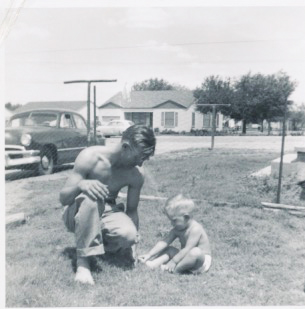 Right: Dad and me, circa 1952.
Right: Dad and me, circa 1952.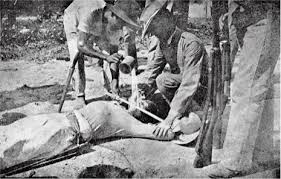 ¶ “Enhanced interrogation” torture techniques have long been part of US military tactics. Pictured at left: Marines waterboarding a prisoner of war in the 1899-1902 war in the Philippines. An illustration similar to this appeared on the 22 May 1902 issue of
¶ “Enhanced interrogation” torture techniques have long been part of US military tactics. Pictured at left: Marines waterboarding a prisoner of war in the 1899-1902 war in the Philippines. An illustration similar to this appeared on the 22 May 1902 issue of  ¶ Preach it. “Americans’ right to free speech should not be proportionate to their bank accounts. —US Senator and presidential candidate Bernie Sanders (I-VT)
¶ Preach it. “Americans’ right to free speech should not be proportionate to their bank accounts. —US Senator and presidential candidate Bernie Sanders (I-VT)